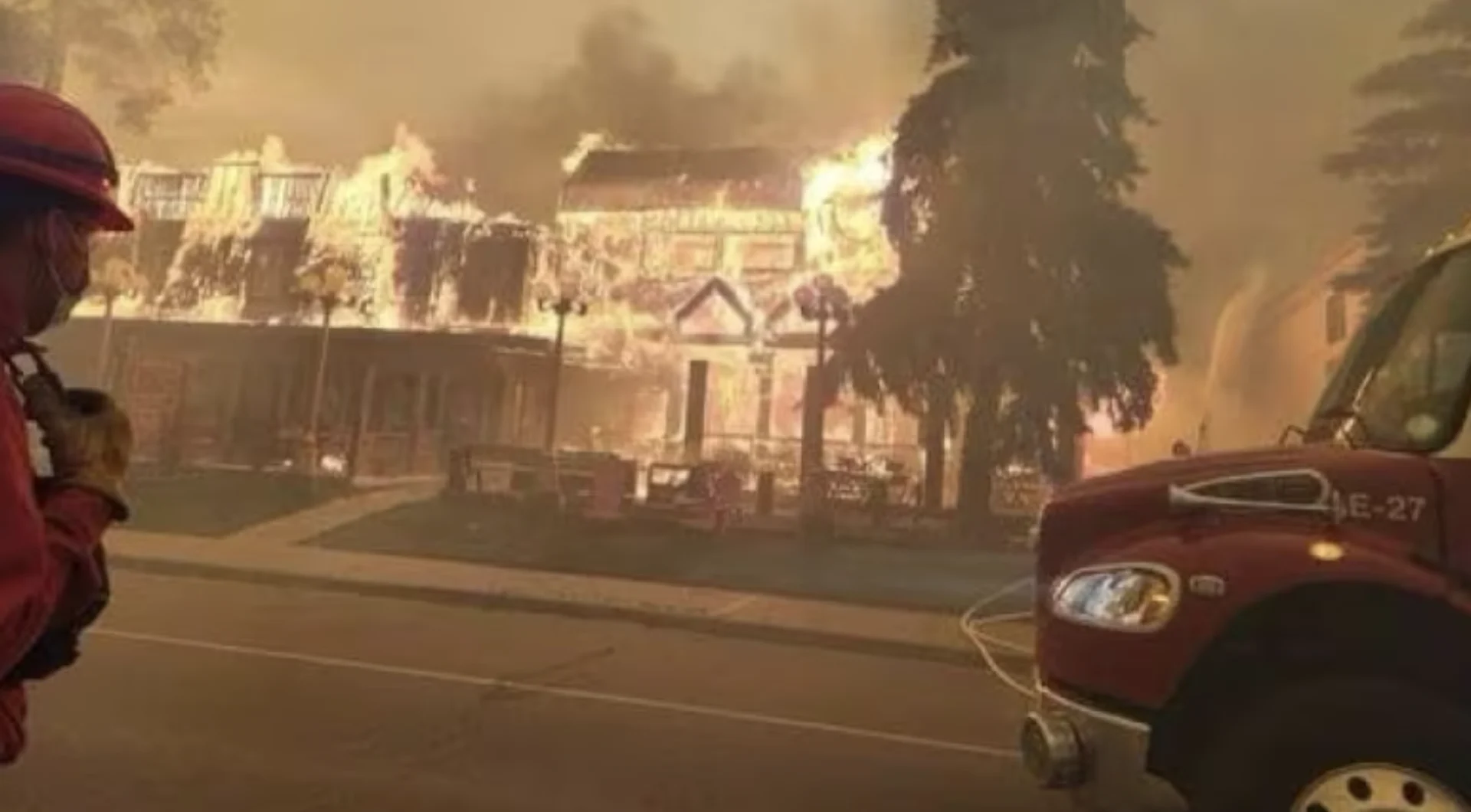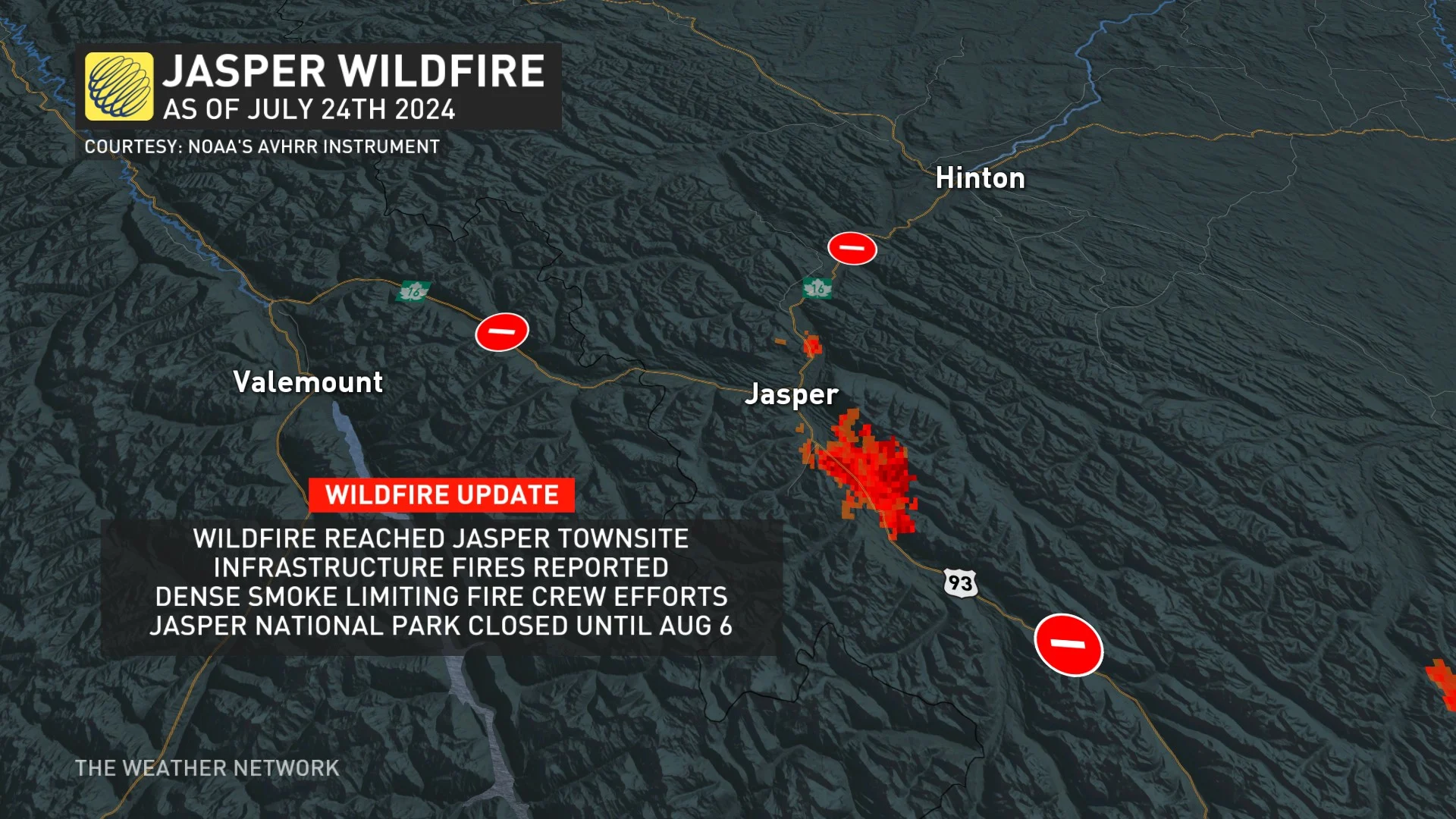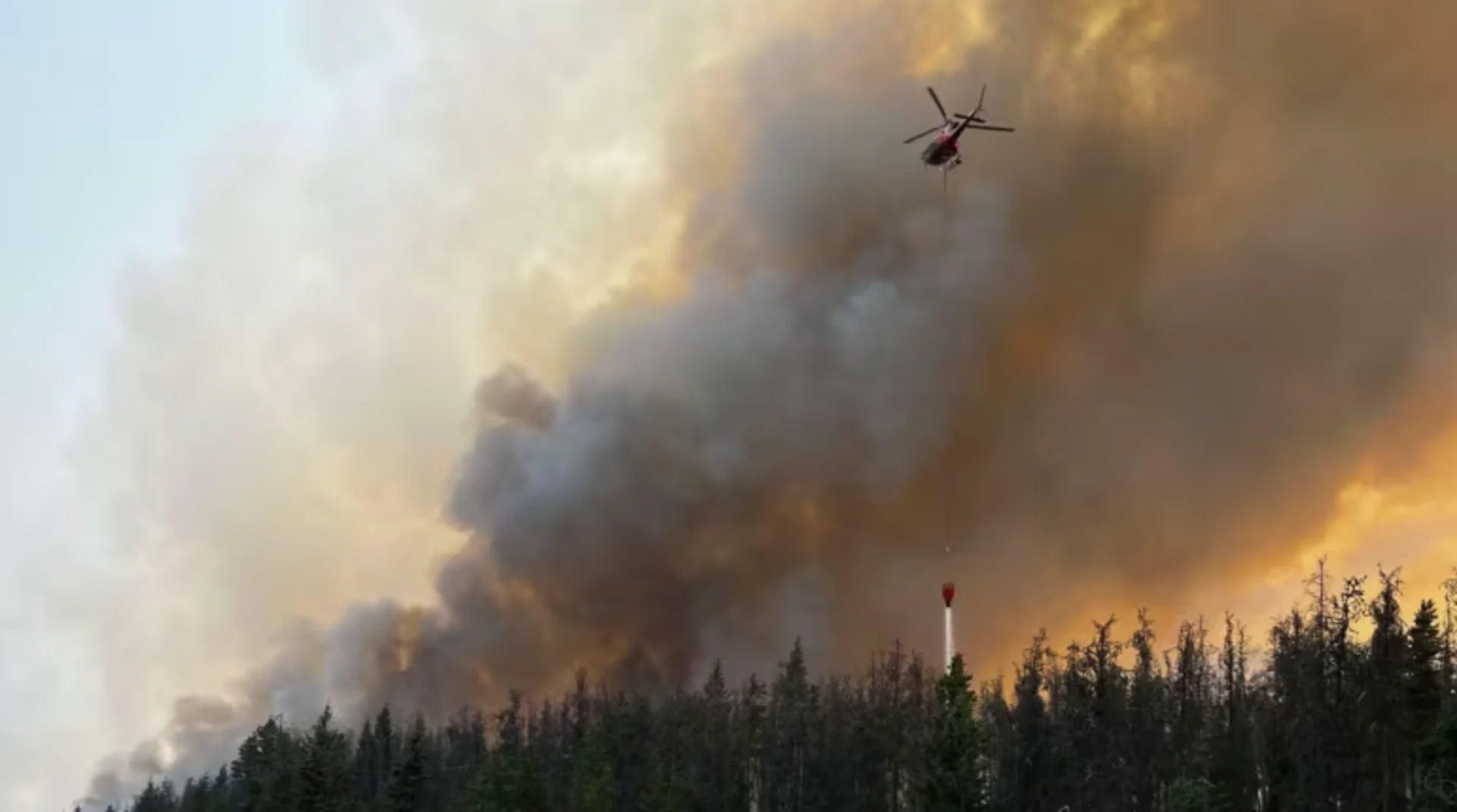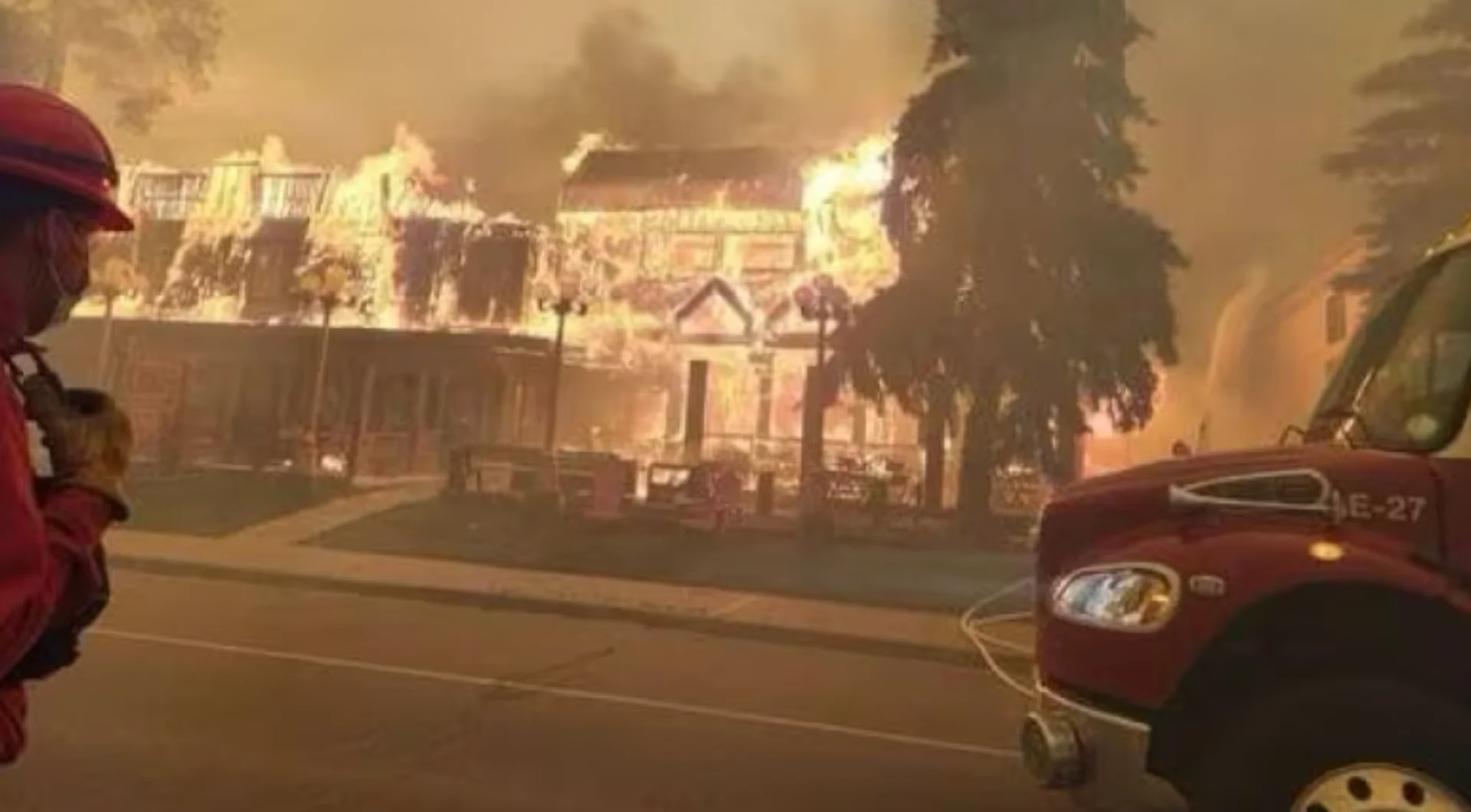
Jasper faces 'significant loss' of buildings as wildfire engulfs town
CANADA'S WILDFIRES: Visit The Weather Network's wildfire hub to keep up with the latest on the active wildfire season across Canada.
Jasper Mayor Richard Ireland choked up Wednesday night, reflecting on how an evacuation order issued days ago may have saved thousands of lives, while an out-of-control wildfire burned his community.
A wildfire had threatened the Alberta mountainside townsite for days from the south, but finally reached it in the evening.
Ireland knew little more than the rest of the public Wednesday night about the damage toll, as flames consumed multiple buildings, including the Maligne Lodge and at least the grounds of the Fairmont Jasper Park Lodge.
"This is simply our community's worst nightmare," Ireland told CBC News.
"People are the heartbeat of every community. The people have been saved and that is significant. We can find a way to rebuild. We can find each other to hug again, because we all got out."
SEE ALSO: Best practices to keep yourself safe from wildfire smoke
Parks Canada said "significant loss has occurred within the townsite" in a social media post at 10 p.m. MT, but was unable to "report on the extent of damage to specific locations or neighbourhoods at this time."
"Today has been an exceptionally difficult day for Jasperites, incident personnel and everyone who loves Jasper," Parks Canada said in its statement.
Tim Horrocks, owner of Sunhouse Cafe, recalls Jasper as an "eerie environment" when he evacuated Monday night.
"There was a lot of smoke in town at that point. There was ash falling from the sky," Horrocks told CBC Radio host Mark Connolly during a radio special Wednesday evening.
Horrocks was not sure of the extent of the damage on Patricia Street, where the contemporary Australian cafe is located. He hoped the fire wouldn't reach the townsite. Now, he hopes it can be saved.
"I love living there," he said. "As early as last week, we were just commenting on how spectacular and magical the place is when summer is in full swing."
Karyn Decore, whose family owned Maligne Lodge for over 60 years, is mourning the loss of their establishment and heartbroken for her staff — many of whom come from countries around the world. The lodge was among the buildings burned Wednesday night.
RELATED: Thousands of tourists among those forced to flee Jasper National Park

(NOAA/The Weather Network)
"It's tragic, it's devastating," Decore told Connelly.
"It's sad for us and it's sad for everyone in town."
Her family also owns the Tonquin Inn in Jasper, but while on air, she was unsure whether the second hotel was lost too.
Decore called Jasper a "national treasure" Wednesday night.
RELATED: Does breathing in wildfire smoke mean lung issues for life?
"It is one of the most precious parks and jewels we have in Canada," she said. "To see this town get consumed by fire is absolutely appalling."
Parks Canada started relocating many first responders to Hinton, Alta., Wednesday, and a cavalcade of RCMP vehicles drove out of the community in the evening. As of 8:30 p.m., air quality worsened so much that firefighters without self-contained breathing apparatuses were forced to evacuate.
Structural firefighters are still in town trying to protect the town about 365 kilometres west of Edmonton. They are trying to protect buildings and critical infrastructure, including the wastewater treatment plant and Trans Mountain Pipeline — among others.
"We got as many resources as we were able to, here, as fast as we could, to respond to this fire," James Eastham, wildfire information officer for the Jasper fire, told reporters Wednesday night.
"Unfortunately, given the conditions and given the fire behaviour today, there was nothing that those resources could do to prevent the spread of the fire into the town."
Alberta will be receiving help from the federal government to battle wildfires, Emergency Preparedness Minister Harjit Sajjan said on X, formerly Twitter, Wednesday night. The aid comes after Public Safety and Emergency Services Minister Mike Ellis and Forestry and Parks Minister Todd Loewen explained the situation to their federal counterparts.
In a video posted to X, Alberta Premier Danielle Smith said she was "heartbroken" to see reports that the wildfire had entered the townsite.
"Like you, I'm watching the tragedy unfold in Jasper and my thoughts are with the people who have evacuated and are watching this as well," Smith said. "We're gonna do everything we can, to put this fire out."
Prime Minister Justin Trudeau, in a statement also posted to X, said his government had received Alberta's request for federal assistance.
"We're mobilizing every necessary resource available," he said. "To everyone who is fighting these wildfires or helping those evacuating from Jasper: thank you."
More than 176 total wildfires were burning throughout the province as of 10 p.m. MT, according to Alberta Wildfire. The province says more than 17,500 people in Alberta are displaced by various fires.
The government has asked the feds for more firefighting resources, aerial support to move crews and equipment and help evacuating remote communities — among other things, Loewen said.

A wildfire south of Jasper's townsite prompted an evacuation order Monday night. (Submitted by Trina Pelland Taylor)
One of two fires, fed by parched conditions and strong winds, reached the Jasper townsite from the south shortly before 6:45 p.m.
The fire activity is so severe, Parks Canada announced on Facebook late Wednesday afternoon, that it is moving first responders to Hinton.
At the time, some firefighting personnel, aircraft and "a small number" of incident command staff were kept in Jasper.
"This decision has not been made lightly," the post said, but they had to limit the number of responders exposed to the fires, given their intensities.
"The safety of the public and responders is our top priority."
SEE ALSO: Best practices to keep yourself safe from wildfire smoke
Parks Canada incident commander Katie Ellsworth, during a news conference Wednesday morning, warned crews would face another challenging day.
Dropping water on the fire from helicopters proved ineffective Wednesday afternoon and water bombers were unable to help due to dangerous flying conditions. Fire guards weren't able to be completed before heavy equipment had to be pulled from the line for safety, according to the joint news release.
An ignition specialist had arrived earlier Wednesday to help finish landscape-level ignition, which would bring the fire toward large holding features like Highway 16 and the Athabasca River, the release said. But "unfavourable conditions" didn't allow the work to be finished.
WATCH: How does this Canadian fire season compare to 2023?
About 15 mm to 30 mm of rain combined are expected in Jasper over Wednesday night and Thursday, according to Environment and Climate Change Canada's forecast.
But earlier Wednesday, Ellsworth noted that "rain doesn't count until it's on the ground and there isn't enough rain in this forecast to control the wildfire."
"We are working very hard to protect the community," Ellsworth said.
Jasper is the largest national park in the Canadian Rockies — covering 11,228 square kilometres of extensive trails and mountain terrain — and getting the message out to everyone on the trail has proven difficult.
During Wednesday's news conference, Ellsworth said 245 hikers have either been picked up or helped to leave the park since the evacuation began.
She said helicopter crews are flying low along the trails, working to airlift stranded hikers out or direct them toward a safe trailhead, when possible.

The Maligne Lodge hotel is one of the structures that burned in Jasper, Alta., after a wildfire reached the townsite Wednesday evening. (Submitted)
She said the most dangerous backcountry areas have been cleared but the sweeps will continue Wednesday in lower-risk areas.
All hikers reported missing or in distress have been accounted for, but Albertans are encouraged to contact people who may be in the mountains and unaware of the fire danger.
Reception centres set up
Thousands of vehicles gridlocked roads once the evacuation order came. Wildfires cut off highway access east to Edmonton and south along the Icefields Parkway, so many were forced west into British Columbia. Evacuees were eventually redirected to Alberta.
With wildfires cutting off highway access east to Edmonton and south along the Icefields Parkway, many were forced west into British Columbia. Evacuees were initially ordered west but were later redirected to Alberta.
Reception centres have since been set up in Grande Prairie, Calgary and Edmonton, where evacuees are being helped with accommodations.
This article, written by Nicholas Frew and Thandiwe Konguavi, was originally published for CBC News on Thursday, July 25, 2024. It contains files from Wallis Snowdon, Madeleine Cummings and The National.










